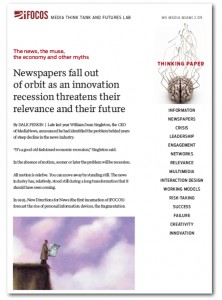
Two programs, the latest in a long conversation, have brought smart people together this week to save journalism’s role in democracy.
Journalism That Matters, a community of “media innovators and stakeholders,” is concluding a three-day seminar at the Poynter Institute “adapting journalism to the new news ecology.”
At the University of Nevada in Reno a smaller group is working with IDEO, the innovation/design agency, to brainstorm a journalistic culture for innovation.
Both are earnest initiatives from concerned people. The activities seem to be inspired by the notion that democracy is in peril because some U.S. newspapers, as well as a few other news-based companies, are failing. This is a popular view of the world by U.S. journalists and publishers, but one that is not shared in other sectors or in other countries.
Actually, democracy is being served by an unprecedented emergence of new voices, platforms, technologies, and mediums for news and journalism. It’s called the democratization of media. While this democratization may be bad news for newspapers and other traditional forms of journalism, it is very good for society. The intrinsic needs of a democracy are beginning to be fulfilled by a world of voices and sources. Some are professionals, some are experts, but many are ordinary citizens with exceptional tools and a variety of skills.
In the nation’s capital, the place where I work and live, there are more people than ever committing acts of journalism despite the closing of a few news bureaus. They participate in the civics exercise known as democracy as never before: covering, reporting, broadcasting, blogging. podcasting, videocasting, photographing, texting, Twittering, mobilizing, crowdsourcing, capturing and engaging every nuance of governance and the culture. While sense making can take a little work in the changed mediascape of Washington, the citizenry seems to have a knack for finding and extracting meaning from myriad choices and non-traditional sources for news and information. Democracy is advanced civics.
The sobering and threatening proposition facing traditionalists is that most of the compelling new forms, formats and metaphors for news and journalism are coming from outside the news industry. At last week’s We Media conference, we showcased dozens of dazzling ideas at the tip of outside innovation.
Innovation and game changing were themes of the conference. At the closing session Alan Webber, the entrepreneur and author who founded Fast Company magazine and edited the Harvard Business Review, asked me if institutional media could reinvent itself. I quoted a famous problem-solver who said something like “we can’t solve problems by using the same kind of thinking we used when we created them.”
Einstein, who knew something about discovery, also said that “whoever undertakes to set himself up as judge in the field of truth and knowledge is shipwrecked by the laughter of the gods.”
Imagination is more important than knowledge. The only course for newspapers, and perhaps for other media institutions as well, is radical innovation. I wrote about the newspaper problem in a Thinking Paper for the We Media conference. You can download it here and listen to the gods laugh.